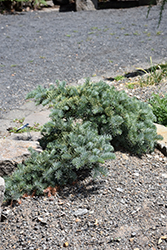Prostrate California Red Fir
Abies magnifica 'Prostrata'
Height: 3 feet
Spread: 4 feet
Sunlight:
![]()
Hardiness Zone: 5
Description:
An attractive low-growing evergreen with blue-green foliage; an upright groundcover that slowly spreads and occasionally sends up vertical leaders; needs protection from drying winds
Ornamental Features
Prostrate California Red Fir is a dwarf conifer which is primarily valued in the garden for its ornamental upright and spreading habit of growth. It has attractive bluish-green evergreen foliage which emerges silvery blue in spring. The needles are highly ornamental and remain bluish-green throughout the winter.
Landscape Attributes
Prostrate California Red Fir is a multi-stemmed evergreen shrub with an upright spreading habit of growth. Its average texture blends into the landscape, but can be balanced by one or two finer or coarser trees or shrubs for an effective composition.
This is a relatively low maintenance shrub, and usually looks its best without pruning, although it will tolerate pruning. It has no significant negative characteristics.
Prostrate California Red Fir is recommended for the following landscape applications;
- Rock/Alpine Gardens
- General Garden Use
- Groundcover
Planting & Growing
Prostrate California Red Fir will grow to be about 3 feet tall at maturity, with a spread of 4 feet. It tends to fill out right to the ground and therefore doesn't necessarily require facer plants in front. It grows at a slow rate, and under ideal conditions can be expected to live for 50 years or more.
This shrub should only be grown in full sunlight. It prefers to grow in average to moist conditions, and shouldn't be allowed to dry out. It is not particular as to soil pH, but grows best in sandy soils. It is quite intolerant of urban pollution, therefore inner city or urban streetside plantings are best avoided, and will benefit from being planted in a relatively sheltered location. Consider applying a thick mulch around the root zone in winter to protect it in exposed locations or colder microclimates. This is a selection of a native North American species.
